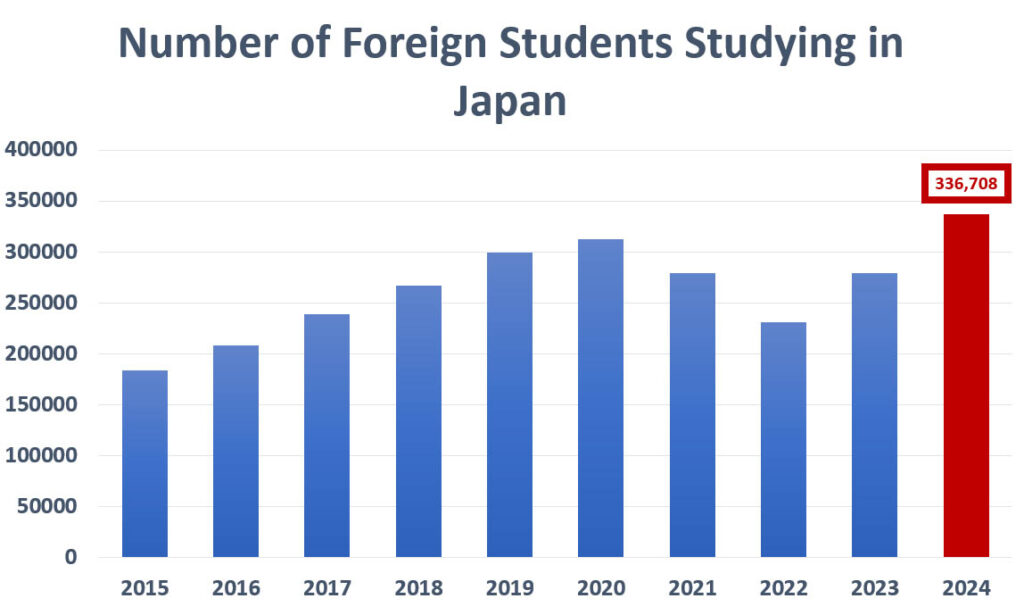The number of students studying in Japan has reached a new high. Study & Live Japan Association has put forward five key reminders to help students plan their study abroad in Japan smoothly.

TOKYO, JAPAN (MERXWIRE) – According to the survey on the enrollment of international students recently released by the Ministry of Education, Culture, Sports, Science and Technology (MEXT), the number of international students studying in Japan in 2024 will reach 336,708, with an annual growth rate of 20.6%, which not only successfully surpassed the 312,000 in 2019 before the epidemic, but also set a record high. Among them, 229,467 students chose to study in higher education institutions (such as universities, vocational schools, and research institutes), and another 107,241 students studied Japanese language in Japanese language education institutions. From the perspective of the source countries of international students, China is still the largest (about 123,485 people, accounting for 36.7%), followed by Nepal (64,816 people, 19.2%), Vietnam (40,323 people, 12.0%), and Myanmar, South Korea, and other countries.
In terms of student status, the number of international students in higher education institutions has shown an overall growth, and the number of students in almost all types of studies has increased. As for Japanese language educational institutions, the number of international students this year has also reached a record high, surpassing the previous year’s statistics since 2011, particularly in vocational schools that offer vocational skills training, with an annual growth rate of 64.9%.
To strengthen the international competitiveness of higher education, the Japanese government and education departments are actively promoting a diversified policy for international students. It is expected that the total number of international students will expand to 400,000 by 2033. Under this trend, Study & Live Japan Association, an organization that guides those who intend to immigrate and study in Japan, integrates expert advice and practical experience, and specially proposes “Five Important Reminders for Studying in Japan” to help students plan their study abroad in Japan smoothly.

Firstly, it is crucial to choose the right path for your studies. The Japanese education system encompasses Japanese language schools, vocational schools, universities, junior colleges, and research institutes, each with its distinct characteristics and admission requirements. For students whose Japanese has not yet reached the requirements of formal degree courses, they may consider attending a Japanese language school as a transitional stage to connect with higher education, laying the foundation for subsequent academic or career development.
In terms of financial planning, although the recent depreciation of the Japanese yen has made the cost of studying abroad and living expenses more affordable, students and parents should still properly estimate their overall budget, including tuition, accommodation, living expenses, and necessary medical expenses. At the same time, it is recommended to set aside emergency funds to deal with unexpected situations that may arise during life in Japan.
Visa management during the study period should not be ignored. Students should carefully check the qualifications and related conditions of various visas. For example, if international students wish topart-time work in Japan, they must first obtain a “Certificate of Permit for Activities Outside the Qualifications”. The weekly work hours shall not exceed 28 hours. Additionally, during summer and winter vacations, the maximum daily work hours are limited to 8 hours. In addition, if you intend to change your visa to work after graduation, you also need to understand the relevant application process and qualifications as soon as possible to ensure that your studies and career can be seamlessly connected.
Language ability and cultural adaptation are also important keys to the success of studying abroad. With the rapid increase in the number of international students, possessing good Japanese language skills (such as passing the JLPT N2 or N1) will enhance academic performance and interpersonal communication. Additionally, actively participating in campus activities and understanding Japanese cultural customs can help integrate into local life and social circles more smoothly.
Finally, the Japanese government has introduced several new systems to support international students in terms of employment and future planning after graduation. For example, graduates from vocational schools can work in specific professional fields through the “Specific Activities” visa, while university graduates have relatively higher flexibility in job hunting. It is recommended that international students continue to monitor government policies and labor market trends and utilize relevant resources effectively to avoid missing out on potential opportunities.
Media Contacts:
Study & Live Japan Association
PR Agency:
MERXWIRE INC.
Ada Huang
pr@merxwire.com
SOURCE:
Study & Live Japan Association



